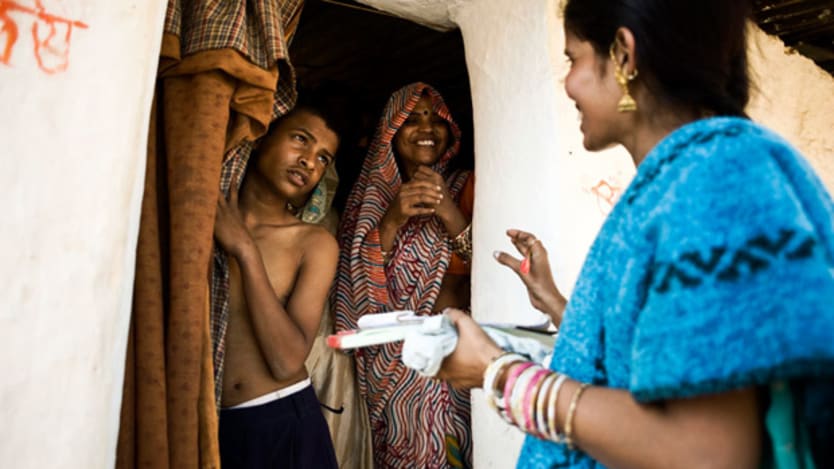
Tuberculosis kills two to three people every minute, and continues to be a threat to global public health. This does not have to be the case: TB is a largely preventable and treatable disease, for which we’ve had effective treatments since the 1940s. And yet the disease rages on.
Unfortunately, our collective inattentiveness to TB has given rise to the greater challenge and danger posed by multi-drug resistant TB — MDR-TB. Globally, only 20 percent of patients with MDR-TB were on treatment in 2013. These low treatment rates are fuelling the current “crisis” of drug-resistant TB, compounded by ill-prepared health systems.
Treatment groups have called on governments, drug companies, and donors to urgently step-up care and deliver new and promising treatments for MDR-TB — highlighting the critical importance of collaboration in this effort.
TB fight can ‘still be won’
Under challenging circumstances, the fight against TB can still be won, even in settings as disparate as New York, where I have spent most of my adult and professional life, and Malawi, my home country. Both places have diligently applied tried-and-tested methods of TB control, grounded in partnerships and collaborations with multiple stakeholders — and have achieved significant impact as a result.
Since the peak of New York City’s TB epidemic in 1992, the number of TB cases has dropped by more than 80 percent, accompanied by a drop of over 90 percent in the rate of acquired drug resistance. This success can be attributed to strong political will, which helped to secure sufficient resources needed to improve laboratory diagnosis, ensure adherence to and completion of appropriate treatment, improve infection control, and provide treatment for latent TB infection.
The story in Malawi is even more impressive: in spite of widespread poverty and high HIV prevalence, TB prevalence decreased by 50 percent between 1995 and 2010. A recent national survey of anti-TB drug resistance found the prevalence of MDR-TB among newly diagnosed smear-positive TB cases to be extremely low, at 0.4 percent — testament to the strength of Malawi’s TB control program.
The ‘implementation gap’
However, the growing MDR-TB epidemic around the world is clear evidence that we are not doing all we ought to do to address TB — a clear example of the “implementation gap.”
Both New York and Malawi succeeded where others have struggled because they were able to find smart ways to fill those gaps. In New York, the health department intensified collaboration with public and private hospitals, private physicians, social services agencies, and nongovernmental organizations working with vulnerable populations such as immigrant groups.
Similar joint efforts in Malawi, including collaboration between Malawi’s TB and HIV programs — supplemented by partnerships with international technical and donor organizations — contributed to a vast improvement in patient outcomes.
At the international level, however, a lack of coordinated action has pushed TB to the bottom of the global agenda. This inaction has contributed, in part, to the rise of drug-resistant TB. Countries are now facing epidemics of MDR-TB and extensively drug resistant TB (XDR-TB) — a very real and growing problem that many health systems do not have the capacity to tackle.
A longstanding commitment
At Johnson & Johnson, we have a longstanding commitment to the fight against neglected diseases, including TB and MDR-TB. Through our Janssen Global Public Health group, we strive to accelerate the development and dissemination of innovative solutions to improve health for people around the world, using partnerships to bolster our efforts in all aspects of our work — from R&D to access. Our dedicated teams of scientists and thought leaders work to ensure that patients with MDR-TB have access to the treatments they need to stay healthy and to live full, productive lives.
Working collaboratively in a targeted, thoughtful approach is how we will end TB. We are expanding the Johnson & Johnson network of partners to change the conversation around TB and ensure that TB drug-resistance is at the forefront of global discourse. We are partnering with leading institutions, such as Harvard Medical School and the Global Drug Facility, to address critical gaps in the global TB response and enhance access to innovative solutions.
We also recently announced a collaboration with the International Union Against Tuberculosis and Lung Disease to support its STREAM study — an international, randomized controlled trial to evaluate shorter treatment regimens for MDR-TB.
Finally, Johnson & Johnson is collaborating with the ministries of health in China and South Africa to help expand the capacity of their health systems to treat patients with MDR-TB. Partnership efforts like these galvanize the foremost actors working in TB in common cause, and will help us to reduce the number of deaths from MDR-TB globally.
For MDR-TB, partnerships that extend across sectors are critical. We are working to support viable and sustainable solutions for this disease and other critical public health challenges. Too many people have suffered and too many are dying for the global health community to be complacent.
Together, we have the ability make meaningful change: by redoubling our efforts with partners and raising our ambition, we can ultimately achieve zero TB deaths, zero new TB infections, and zero TB suffering.
Want to learn more? Check out the Healthy Means campaign site and tweet us using #HealthyMeans.
Healthy Means is an online conversation hosted by Devex in partnership with Concern Worldwide, Gavi, GlaxoSmithKline, International Federation of Pharmaceutical Manufacturers & Associations, International Federation of Red Cross and Red Crescent Societies, Johnson & Johnson and the United Nations Population Fund to showcase new ideas and ways we can work together to expand health care and live better lives.
Search for articles
Most Read
- 1
- 2
- 3
- 4
- 5








